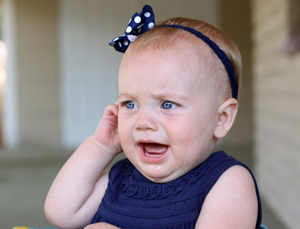Submitted by Mississippi Valley Surgery Center

|
| Ralph Tyner, MD |
If you take care of a young child, you may be all too familiar with the earaches and ear infections that often plague little ones. Painful ear infections can be a rite of passage for kids, and many children experience ear infections at least once during childhood.
When the ear operates in a healthy way, a tube in the ear called the Eustachian tube opens every time we swallow and transmits fresh air through to the middle ear behind the eardrum. This fresh air allows the eardrum to stay in a neutral position and vibrate effectively for proper hearing.
When the Eustachian tube is blocked, air can no longer get into the middle ear cavity, which causes an inflammatory reaction. As a result, bacteria grow on sugar in this fluid and leads to the symptoms of an ear infection: ear pain, trouble hearing, fever, and potentially drainage.
Most ear infections get better on their own or with the assistance of oral antibiotics. In some cases, ear infections or fluid build-up in the middle ear may become a chronic problem, which can lead to other more serious issues such as hearing loss or behavior and speech problems. In these cases, ear tubes offer an effective solution with quick results.
 Ear tubes are tiny — they are smaller than the head of a match — but they do a big job: drain fluid that causes ear infections, pressure, and hearing problems in children.
Ear tubes are tiny — they are smaller than the head of a match — but they do a big job: drain fluid that causes ear infections, pressure, and hearing problems in children.
Dr. Ralph Tyner, a board-certified otolaryngologist at ENT Professional Services, P.C., frequently performs ear tube procedures at the Mississippi Valley Surgery Center.
We asked Dr. Tyner to answer frequently asked questions about ear infections, especially in young children.
Why do children get ear infections?
During the first four months of a child’s life, they are protected by their mother’s antibodies, which were passed to them during pregnancy. As a result, they typically won’t contract colds during this period.
However, once those antibodies wear off, kids have to fight infections on their own, which make them more susceptible to colds. At their young age, the Eustachian tube is also shorter, smaller, and flatter.
“Nasal congestion can cause swelling in the Eustachian tube and block air from getting behind the ear drum. Without fresh air, old air is absorbed by the body and a vacuum is created,” said Dr. Tyner. ”The vacuum causes fluid to be drawn into the space behind the ear drum, and acts as a shock absorber, keeping the ear drum from vibrating normally. It also has nutrients for bacteria. This results in swelling and redness, which typically leads to ear infection symptoms.”
What are the treatment options?
Ear infections are usually treated with antibiotics. During the fall and winter months, kids contract colds more frequently, leading to repetitive fluid and more ear infections.
“When antibiotics aren’t resolving the infections, ear tube procedures are typically done. The ear tubes create a temporary opening to the space behind the ear drum, prevent the vacuum from forming and the fluid from collecting,” said Dr. Tyner. ” Without the fluid in it, both the hearing loss and ear infections are less frequent and less severe.”
What can be expected during and after the procedure?
Dr. Tyner reassures parents and guardians by letting them know that most ear tubes procedure can be done safely at an outpatient facility.
“Most people feel physically and emotionally more comfortable in an outpatient environment,” says Dr. Tyner. Parents are able to be with their child both before and after the procedure. He also says that it’s comforting for caregivers to know that young children will be put under anesthesia with an oxygen mask, and the whole procedure is done within 10 to 15 minutes.
How long is the recovery period?
“After 30-45 minutes most parents won’t even be able to tell their child had surgery that morning, and they will be up and running around in no time,” said Dr. Tyner.
Although the pool or soapy bath water can be a concern for children who have had an ear tubes procedure, it is still important for them to get in the water.
“I tell parents, there is some risk of drainage, but it is more important for children to learn to swim,” said Dr. Tyner.
Dr. Tyner is located at 3385 Dexter Court in Davenport, Iowa. For more information about Dr. Tyner and the other physicians at ENT Professional Services, visit entprofessional.com or call 563-359-1646.
For more information about the Mississippi Valley Surgery Center, visit www.mvhealth.net.
Photo Courtesy of MindFire Communications
